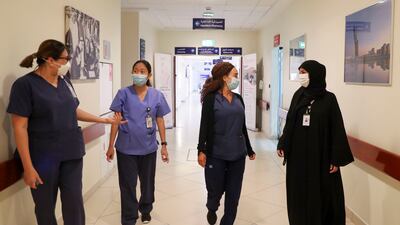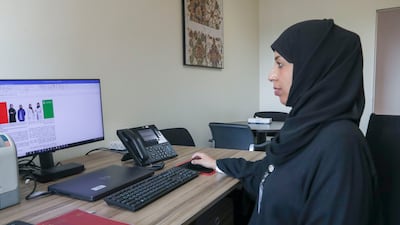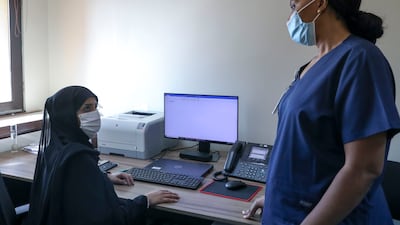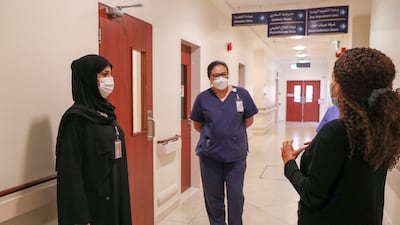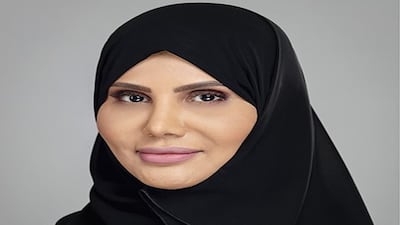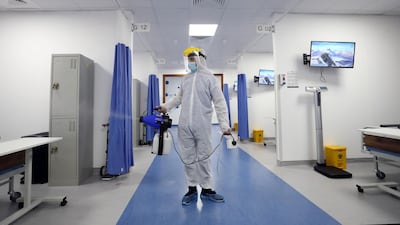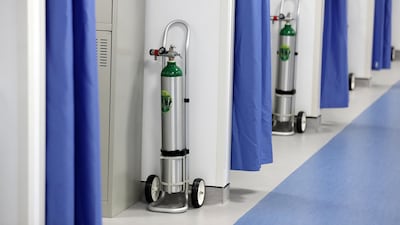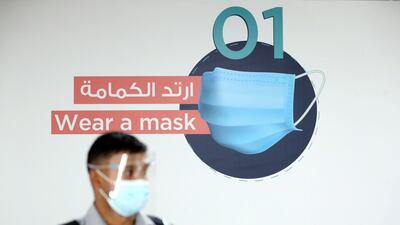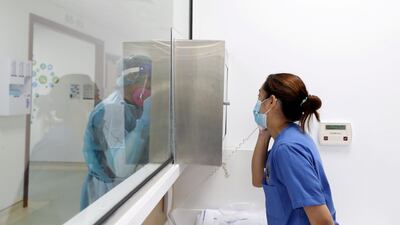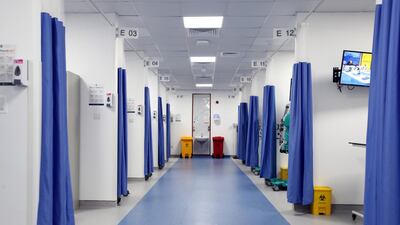As a young girl, Arwa Salem Al Menhali dreamed of being a doctor. But close family ties made it difficult to travel out of Abu Dhabi to study.
Still committed to healthcare, she changed her career path and took up nursing instead.
She climbed the ladder from a ward nurse 12 years ago to now an assistant director of nursing at Corniche Hospital. But the biggest challenge of her career biggest came last year.
Like many frontline workers in the UAE, her work and home life were turned upside down when the Covid-19 pandemic took hold, but she said it was a challenge that she thrived in.
“I live with my mother and my nephews. They lost their mother in a traffic accident so I take care of them now,” she told The National.
“During the midst of the pandemic I felt very distant from them as I would be out of the house for 24-hour periods.
“I didn’t want to risk spreading the virus so I would just come home and sleep after a shift then go back to work again."
Despite the pressure and difficulties of working during a pandemic, Ms Al Menhali is happy about contributing to the battle against Covid-19.
“I felt a mix of emotions seeing people on ventilators, battling something we had never experienced before. But it is also a memory I am really proud of. I’m proud that I helped the UAE battle the pandemic.”
Setting up the first screening centres
Working as part of the operations and management division for Corniche Hospital in Abu Dhabi, Ms Al Menhali, 34, was part of the team that set up some of the first drive-through screening centres in Abu Dhabi.
She helped bring to life the screening tent in Zayed Sports City, then was made in-charge of the Al Wathba testing centre.
At one of the largest screening sites at a workers camp on Reem Island, Ms Al Menhali also oversaw the care of more than 10,000 people, placing them into red and green zones depending on their health status.
“I remember when we finished constructing one of the first screening centres, Sheikh Mohamed bin Zayed came to us and said how impressed he was with our work,” she said.
“He [Sheikh Mohamed] said he wanted to open more tents like the one we were standing in. That’s when we set off on our mission to open several in Abu Dhabi, Dubai and the Northern Emirates.”
While it was one of the toughest years of her working life, Ms Al Menhali said it was a challenge she would “take on again”, but hopes there won’t be a need to.
As the virus started to spread in the first wave and nurses worked around the clock, she walked away with one thing firmly embedded in her mind.
“Nurses really are the spinal cord of the healthcare sector,” she said.
“Every challenge they faced they overcame. It wasn’t without tears or stress, but they did everything they could for those patients.”
Need for more nurses
Aysha Al Mahri, group chief nursing officer for Abu Dhabi Health Services (Seha), is another Emirati woman who put in the hard yards during the pandemic.
Working on the front line hand-in-hand with more than 8,500 medical staff that worked across the group, she helped on-board 1,500 additional nurses to deal with the fallout from the pandemic in the early stages.
“I still remember the day the World Health Organisation declared Covid-19 a pandemic. I was already observing what was going on around the world and was putting things in place to make sure we were ready for any surges,” she said.
“I was hearing of so many countries that were facing a shortage of healthcare professionals for critical care, so we made sure that was one of our priorities; upskilling our current workforce and recruiting new ones.”
Although her role was predominantly administration-based, when staff were outsourced to the Covid-19 field hospitals around the country, Ms Al Mahri made the decision to join them.
She said the hands-on role helped her to adapt processes that needed to change because of new waves and critical care needs.
“For the role I was in, you needed to be on the ground. Not only to see what was happening but to show support to staff too," said the mother-of-two.
“During the pandemic I think all of us healthcare workers went through huge mental and physical stress.
“We were fighting an enemy we didn’t know. We didn’t know its strengths or its weaknesses, but we were responsible for helping patients.
"I lived away from my family and two small boys for months at a time too, it was tough but necessary."
Coming from a family of three brothers and five sisters, Ms Al Mahri said she was the only one in her family to work in the healthcare sector.
Though it wasn’t her career of choice in her early years, the pandemic – though difficult – has reassured her that she is in the right place.
“In the UAE I have never felt any barriers in the way of things I want to achieve as a woman,” she said.
“Any opportunities my brothers had, I had too and I am thankful for that. To be felicitated on Emirati Women’s Day is an honour. Being a female has never created challenges for me and that is a blessing.”
